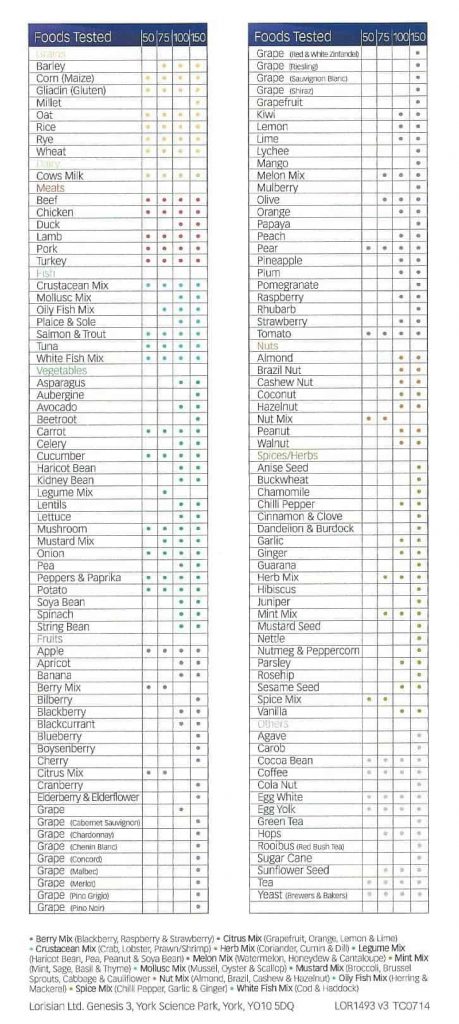Menu
Fed Up Of Feeling Bloated?
Discover with Food Intolerance Testing How You Can Eat and Feel Better
Do You Suffer With The Following?
- Energy Highs and Lows
- Food Cravings
- Bloating
- Headaches
- Poor Concentration
- Weight Problems
Food Intolerance Testing
There are many different reasons why you may not tolerate certain foods. This can range from deficiencies in enzyme production or sensitivity to chemicals, bacterial overgrowth related to excess sugar, whilst others are immune responses related to food specific antibodies. If the body has experienced a great deal of stress or prolonged medication the small intestines can be prone to become more permeable or “leaky”. This can mean that the breakdown products in foods can be absorbed through the intestine wall, when it wouldn’t normally be permeable to these particles.
The body can mount an immune reponse known as an IgG antibody response to the protein components. Sometimes the body also cannot digest lactose in dairy products and gluten in grains, which is found in much higher quantities in the modern wheat, than it ever used to be in the ancient grains such as Spelt. We can also have an overgrowth of yeast in the intestines, especially following antibiotic use, which can cause bloating and gas as it ferments with sugars in our diet.
The IgG response causes these immune cells to bind to specific food proteins to form immune complexes in the body, which can accumulate in joints and other organs where they can cause inflammation and a range of different symptoms from headaches, digestive problems, bloating, IBS, itching skin, joint aches and pains, weight gain and low mood.
Many symptoms can be linked to food intolerance which include:
- Abdominal Pain
- Aches and Pains
- Acne
- Bloating
- Constipation
- Chronic Fatigue Syndrome
- Diarrhoea
- Dizziness
- Eczema
- Fatigue
- Irritable Bowel Syndrome
- Itching
- Fluid Retention
- Headaches
- Hyperactivity
- Migraine
- Nausea
- Rashes
- Rhinitis
- Sinusitis
- Stomach Cramps
- Tension
- Tiredness
- Urticaria
- Weight Loss/ Weight Gain
- Wheezing
The Food Intolerance Test is a pin prick blood test, which is sent to the York Test Laboratories for analysis against food specific IgG antibody reactions. It does not test for lactose intolerance but can test against protein intolerance in milk and other products such as gluten and a whole range of different foods.
Your results should be clear about any IgG response, however if you would like the results to be reviewed Alison Waring will do so and reply by email with suggestions for dietary changes. Alternatively you can request a Zoom or a face to face consultation to discuss the necessary dietary changes required by your test results at Alison’s usual consultation charge. See below for prices.
Alison advises that it is more comprehensive to get a blood test AND a hair test as lactose intolerance isn’t tested by the blood test and there are nuances of each test that provide different information. Hair tests are not done at the clinic you can obtain a home testing kit online.
if you have stopped eating some food due to your symptoms there is no need to reintroduce food for the hair testing but for the blood test you should reintroduce the food at least 2 weeks before taking the blood test.
Price List:
Test and Results review by email response £100
Test and Zoom or face to face discussion of results £155
If the test is carried out during the course of your Osteopathic or Buteyko consultation with Alison Waring and email review £135 (£80 test + normal treatment charge £55)
For Children or Adults who would prefer not to have a blood test sample for food intolerance testing, YNH recommends Kinesiology.
What Patient's Are Saying
“My son, aged 3 at the time, was suffering from regular stomach upsets, sickness bugs and had very low immunity. He was missing 1 in every 3-4 weeks of childcare and I wasn’t having much success getting any help via the NHS – the GP wrote it off as ‘one of those stages’ and we were facing a years wait to see a paediatric consultant. I contacted Clarissa and we soon had our first appointment where we went into great detail around his symptoms and background. At this first appointment, Clarissa set clear objectives and gave us dietary changes and supplement suggestions to support gut health and immunity. Clarissa supported us until my son was doing a lot better and he continues to have far better health. Thank you Clarissa“
Rosie, YORK
WHO SHOULD SEE A NUTRITIONAL THERAPIST?
Busy Professionals
Running a business is hard enough without also having to worry about meal plans, so let us worry about it, instead.
Parents
There's nothing harder than juggling a busy household as well as keeping on top of your health. So let us fix that for you.
Students
Eat better and get more out of your studies, less take away pizza's and more quick and easy healthy meals at home that doesn't break the bank.
Babies and Children
Food allergies, intolerance and gut problems are very common with children today. Seek advice from our Registered Nutritional Therapist.
Athletes
Get the best from your body by knowing when to eat, what to eat and how you can maximise your recovery from sport and racing events.
Elderly
Digestion can be more difficult as we get older but maximising how you absorb your food and improving your bone health can all be achieved with nutritional therapy.
Nutrition
FREE 15 MIN CHAT
- Discuss Your Case
- Learn How We Can Help
- No Obligation Chat
Our Practitioners
Clarissa Nolan
Nutritionalist
Charlotte Batchelor
Homeopath
Alison Waring
OSTEOPATH and Naturopath
Frequently asked questions
about nutritional therapy
Registered Nutritional Therapists work with the client to create nutritional and lifestyle plans that are tailored specifically to their client. It is based on the principle that food provides nutrients that our bodies need in order to maintain a state of wellbeing and balance.
Clients fill in a detailed questionnaire which covers their health history, family history, current symptoms, a diet diary and any medication or supplements being taken.
This information, along with a consultation, is used to create a tailored action plan for the client, since what works for one person may not work for the next.
Nutritional Therapists can also recommend functional testing which can help to identify metabolic, nutritional and other imbalances.
Test results help to create an even more personalised plan by working out the underlying causes of symptoms and thereby to correct imbalances.
Nutritional Therapy is not a one size fits all approach and aims to address nutritional balance for the specific person. It is not a replacement for medical advice.
Nutritional therapists can help you to lose weight, if you need to lose weight, in a healthy way and maintain a stable, healthy weight.
Often, just by tweaking your diet and lifestyle, weight loss and better skin are a welcome side effect!
By the same token, by looking at the imbalances in a person’s make up, it may be possible to help a person who is underweight to gain weight healthily too.
Not usually. Although our nutritional therapist Clarissa Nolan can take blood as she has experience and specialist training in phlebotomy.
Registered Nutritional Therapy practitioners have undergone rigorous training so they can help with a variety of issues such digestive issues, detoxification, food allergies and intolerances, weight loss and chronic pain conditions. Our Nutritional Therapist Clarissa Nolan has a special interest in chronic fatigue, cancer and gut issues.
Registered Nutritional Therapists are uniquely trained to understand how nutrients, other foods and lifestyle factors influence the function of the body by considering biochemical individuality in a patient centred manner.
Diet and lifestyle can affect how you feel, look, act and think. A poor diet can reduce resilience to infections and stress, slow down concentration and memory. It can lead eventually to poor skin and insulin control, heart disease, digestive problems, memory loss and other chronic conditions.
The number of visits will depend on the individual client and what they wish to achieve. The first two appointments take the longest time as a functional assessment is carried out and those results are fed back. Depending on what the client wishes to achieve, further appointments are then scheduled which usually last from 30 minutes to an hour. These further appointments can take place in clinic or by Skype.
Book Food Intolerance Testing Today
Book a consultation for yourself or even for a loved one or family member. You can simply purchase a gift card via our dedicated page below.
York Natural Health Ltd. Registered in England and Wales No: 08956441 Registered Office Address: 36 York Road, Acomb, York, YO24 4LZ


